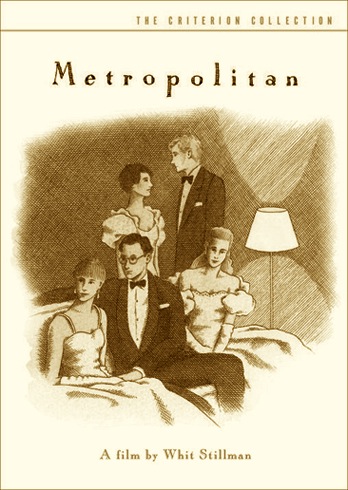
By David Ross. Ever since National Review published this list of conservative films (see here), I have been thinking about the matter. Nearly all great films have conservative elements – one might say that all art is conservative in its greatest moments – but this is cheating; by ‘conservative film’ we mean a film that explicitly and purposefully articulates some aspect of conservative philosophy. By this definition, there are few great conservative films. Jean Renoir’s Grande Illusion (1937), Ernst Lubitsch’s Ninotchka (1939), and Florian Henckel von Donnersmarck’s The Lives of Others (2007) seem to me the greatest. Werner Herzog’s Aguirre: The Wrath of God (1972) is a monumental aesthetic achievement, but one hesitates to call its romantic hero-worship – its Miltonic Satanism – ‘conservative’ in the contemporary American sense of the word.
 Whit Stillman’s Metropolitan (1990) and Barcelona (1994) are fine if less exalted examples of conservative filmcraft. Lively, droll, and not in the least doctrinaire, these films are models for a conservative film movement. Metropolitan is a sequence of chatty interludes set in the dying world of Park Avenue gentility. It is a lament for lost manners, ritual, and social order, even as it concedes a degree of snobbery and attenuation and acknowledges a certain placid decadence. This is the movie’s strength: it understands that its own fondness is not an arguable position or even a position at all; it is a kind of savor for one’s own experience and one’s own kind. The essence of the film’s conservatism is this casual disregard for the utilitarian calculus – the grinding guilty math – that underpins liberalism and orders the modern mind. The entire film seems to speak the words: “Traditions have their charm, and charm is enough.” Barcelona, about American cousins making a hash of things in Spain, is a snappy romantic comedy that skewers anti-Americanism and European smugness generally. Any American who’s lived in Europe will cheer the film’s defense of hamburgers and related metaphysical principles.
Whit Stillman’s Metropolitan (1990) and Barcelona (1994) are fine if less exalted examples of conservative filmcraft. Lively, droll, and not in the least doctrinaire, these films are models for a conservative film movement. Metropolitan is a sequence of chatty interludes set in the dying world of Park Avenue gentility. It is a lament for lost manners, ritual, and social order, even as it concedes a degree of snobbery and attenuation and acknowledges a certain placid decadence. This is the movie’s strength: it understands that its own fondness is not an arguable position or even a position at all; it is a kind of savor for one’s own experience and one’s own kind. The essence of the film’s conservatism is this casual disregard for the utilitarian calculus – the grinding guilty math – that underpins liberalism and orders the modern mind. The entire film seems to speak the words: “Traditions have their charm, and charm is enough.” Barcelona, about American cousins making a hash of things in Spain, is a snappy romantic comedy that skewers anti-Americanism and European smugness generally. Any American who’s lived in Europe will cheer the film’s defense of hamburgers and related metaphysical principles.
For Barcelona’s famous “ant farm” analogy, see here.
For the Telegraph’s list of ‘great’ conservative films, see here.
Posted on October 26th, 2010 at 11:52am.
Excellent lists. Thanks.
I checked out NRO’s previous list of conservative movies some years ago and I am pleased to say that their more recent list is somewhat more authentic, which is a good sign. The earlier list had movies which you had to stretch to call “conservative”. The only movie they blew it both times on was Forest Gump, a movie that may just as easily be interpreted as having a “luck is what determines if you make it, not individual ability” liberal vib. And the guy with the down home wisdom is brain damaged. Given Tom Hank’s political proclivities I wonder if that isn’t the real message there.
As for the Telegraph’s films, Ridley Scott’s “Black Hawk Down”?
Many critics enthusiastically dubbed Black Hawk Down an anti-war film, and it is in some respects a cautionary tale about the perils of nation-building. But I regard it above all as an extraordinarily powerful and deeply patriotic tribute to the heroism and bravery of the US military,
I love films about the bravery of the US military, but when they’re engaged in some poorly planned military adventure in Bozoland by an egotistical President looking to distract from his problems at home it shouldn’t be called an conservative movie. Any more than “Breaker Morant” is an ode to the Australian cavalry. As far as this conservative is concerned, the US military’s job one is preserving our freedom, and I would applaud any film in which they are engaged in that pursuit.
Whit Stillman is one of my favorite directors. Thank you for highlighting him. Did you know he is finally working on a new film? see here: http://www.whitstillman.org/
Why do you consider The Grand Illusion a conservative film? Perhaps it is a rather Tory film (though a French one), but I don’t see it as an American conservative type. If we go with that sort of old-world aristocratic nostalgia, though, I think Powell and Pressburger’s The Life and Death of Colonel Blimp should also be thrown into the mix.
And while there’s plenty of other classic movies that seem to exemplify some conservative values (especially patriotism), here’s a unique I haven’t heard anyone else mention, probably because it’s not widely known or available: Andrzej Wajda’s “Danton,” starring Gerard Depardieu. It’s an account of the the French Revolution’s descent into the Reign of Terror, drawing parallels to the Soviet oppression of Poland in the 1970s-80s, and it’s excellent. There’s a Criterion DVD of it.
David,
I’m not sure why The Lives of Others is considered a “conservative” film. Certainly this liberal finds that film to portray a devastating life under Stasi controlled East Germany. Not sure exactly what is so conservative about the film. Is it that it shows the depravity of abused power? Are liberals somehow supposed to feel offended by the film? Particularly coming on the heels of George W Bush’s massive expansion of this very technology that intrudes upon the personal and private lives of others? Which is something supported by literally millions and millions of so called conservatives. The Stasi could only wish they had the surveillance state the United States has been building up over the last ten years.
I’d say the reason The Lives of Others is a conservative film is that communism received much support from the American left. The right is still maligned by lefties for its anti-communism.